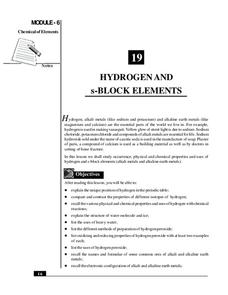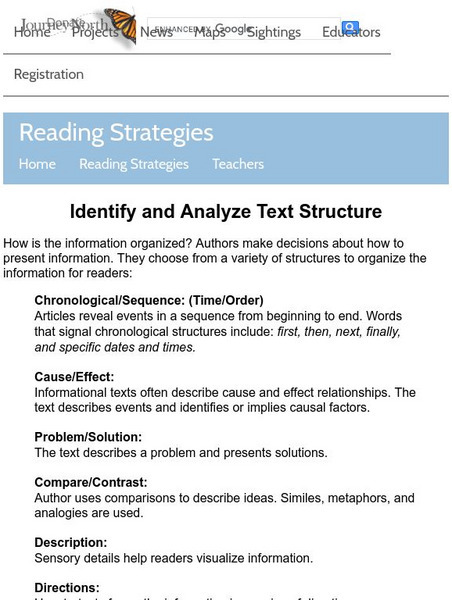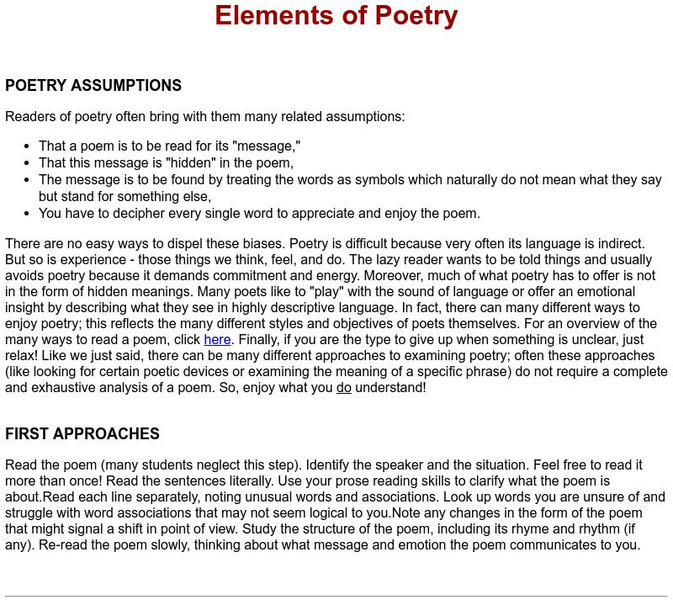National Institute of Open Schooling
Atomic Structure
Learners explain historical findings such as Rutherford and Bohr's contributions, explain wave particle duality, and formulate Heinsenberg's uncertainty principle. They also draw s, p, and d orbitals, explain more historical findings,...
Deer Valley Unified School District
Close Reading: Analyzing Mood and Tone
The AP Literature and Composition exam is all about close reading. Test takers are presented with a passage and asked to analyze how an author uses literary devices to create a desired effect. Prepare your students for the exam with a...
National Institute of Open Schooling
Biomolecules
An informative lesson has learners read about, discuss, and study the classification, structure and importance of the following biomolecules: carbohydrates, proteins, lipids, nucleic acids, and enzymes.
Curated OER
The Metamorphosis: Concept/Vocabulary Analysis
Historically, Franz Kafka's The Metamorphosis has been difficult for many readers to grasp. From the difficult translation issues to the complex plot and themes, the novel's message and story can be lost when learners...
It's About Time
Organic Substances
Host an exciting lab in which learners burn fruit rinds to better understand hydrocarbons. A reading passage and analysis questions wrap up the lesson.
National Institute of Open Schooling
p-Block Elements and Their Compounds – II
Ozone, made of three bonded oxygen atoms, is found 15-30 km above Earth, has a strong smell, is blue, and blocks sunlight from hitting the surface of Earth. The 22nd lesson in a series of 36 specifically focuses on the important elements...
McGraw Hill
Arthropods
Are spiders related to crabs? Study the order of arthropods with a reading selection about animal diversity. It provides details about each class within the order, as well as vivid pictures and explanatory charts.
National Institute of Open Schooling
The Liquid State
Due to surface tension, dew — a liquid, is spherical in shape. Learners explore the properties of liquids in activity seven in this series of 36. Beginning with its basic properties such as boiling point and moving through to surface...
National Institute of Open Schooling
Hydrogen and s-Block Elements
Lesson 19 in the series of 36 analyzes the element hydrogen and the s-block elements. Through readings, answering questions, and discussion, learners write about and explain their occurrence, physical and chemical properties, and...
National Institute of Open Schooling
Chemical Arithmetics
Substances with the same empirical and molecular formula must be differentiated by their structural formula. Part two in a series of 36 has pupils using chemical formulas to calculate how much of a compound is present in a given...
Novelinks
The Lightning Thief: Concept/Vocabulary Analysis
Before you begin reading Percy Jackson and the Lightning Thief by Rick Riordan, read over this comprehensive handout that gives you a plethora of information regarding the story's summary, organizational structure, central...
Museum of Tolerance
Family Tree Activity
Discover the family histories that make the classroom with a family tree activity. Scholars locate information about their family, construct a family tree, and work together to tally where family members are born.
McCook Public Schools
Vocabulary List - Microsoft Word Basics
Never forget a term used in Microsoft Word with these four pages of related vocabulary and their definitions.
Curated OER
Mc Graw Hill: Part 2 Reading: Comparison and Contrast Text Structure
A reference article showing reading strategies to understand text structure of comparison and contrast.
Capital Community College Foundation
Guide to Grammar and Writing: Principles of Organization
In writing and reading organization is the key to a reader's understanding. A great site for those of you who are looking for some further explanation of organization in writing. There is instruction, an example text, and specific...
Curated OER
Mc Graw Hill: Part 2 Reading: Informational Text: Connections Within Text
Learn how information in a text can be connected through compare and contrast, cause and effect, and sequence.
Curated OER
Mc Graw Hill: Part 2 Reading: Determine Main Idea and Supporting Details
A reference article for students to learn about how to determine the main idea and supporting details from the text. Click on the Model for an example with explanation and then click on Practice for a practice exercise.
Annenberg Foundation
Annenberg Learner: Journey North: Reading Strategies: Identify and Analyze Text Structure
Learn how to identify the text structures of chronological/sequence, cause/effect, problem/solution, compare/contrast, description, and directions by using a list of guiding questions.
Other
Lexiconic.net: Elements of Poetry
This resource explains how to approach an analysis of a poem. It discusses assumptions people may have, the importance of reading it closely before analyzing it, looking at the stanza structure, the type of poem, the sound patterns,...
Curated OER
Mc Graw Hill: Part 2 Reading: Determine Main Idea and Supporting Details: Model
An example to guide students in choosing the main idea and supporting details. Click Practice for a practice quiz.
Curated OER
Mc Graw Hill: Part 2 Reading: Determine Main Ideas and Supporting Details
See how to pick out the main ideas and supporting details on this site. Click on Model at the bottom right.
Curated OER
Mc Graw Hill: Part 2 Reading: Determine Main Ideas and Supporting Details
See an example of how to determine the main ideas and supporting details of a story.
Curated OER
Mc Graw Hill: Use Details and Examples
Review how to use text evidence, details, examples, and personal experiences to make inferences then read a passage to practice on your own.
Other
Kim's Korner: Patterns of Organization
This resource from Kim's Korner for Teacher Talk defines various patterns of text organization and provides a brief essay example of each pattern.

















